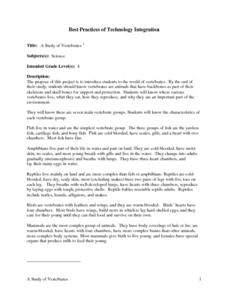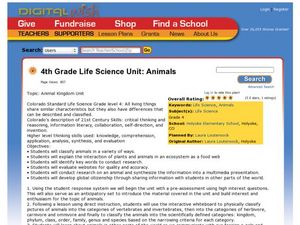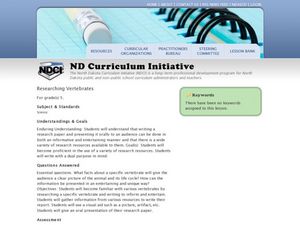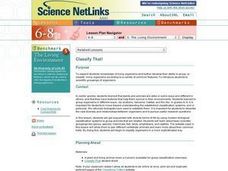NOAA
Vertebrates I
I spy a spine. The 19th installment of a 23-part NOAA Enrichment in Marine sciences and Oceanography (NEMO) program explores vertebrate species, such as sharks and other fish. Learners take part in an activity evaluating the...
Curated OER
Life Science: Living Things
Have your class build their vocabulary bank by studying life science terms. Basic terms like organism, cell, unicellular, and vertebrate are included on the definition sheet provided. Demonstrate how to identify different life science...
NOAA
Vertebrates II
Mammals of the ocean unite! Or not. The 20th installment of a 23-part NOAA Enrichment in Marine sciences and Oceanography (NEMO) program investigates how warm-blooded marine mammals survive in water. In the class activity, learners use...
Curated OER
The Five Classes of Vertebrates
What a terrific lesson! Learners discuss the animal kingdom, and classify them as vertebrates and invertebrates. They also identify them as fish, amphibians, reptiles, birds, and mammals. There is even a taxonomic breakdown of popular...
Curated OER
Vertebrate Dioramas
Students are able to describe the development of their chosen form of vertebrate life from the past to the present in a four to six page typed paper. They explain the use of phylogenetic tree. Students use the phylogenetic tree to...
Curated OER
Life in a Forest Stream
Students assess macro-invertebrates from a stream. In this science lesson plan, students observe, classify and identify organisms found in a stream. A lab station is constructed at the stream sight and students study the different...
Curated OER
A Study of Vertebrates
Fourth graders investigate the characteristics of each vertebrate group. They take notes in a science journal, and in small groups create a HyperStudio slideshow presentation to present information about a specific vertebrate group.
Curated OER
Vertebrates
Students identify and describe five main groups of the Phylum Chordata. They discover that the Phylum Chordata is the vertebrates. Students identify the main difference between invertebrates and vertebrates. They read passages about...
Curated OER
The History of Life on Earth
Using meters as years, your class works together to map out the geologic time scale on a football field. Plenty of background information is included in this lesson plan as well as several resource links and a student worksheet. Your...
Curated OER
Oceans in Motion
This simple activity introduces children to basic marine life as well as to show them the necessity of protecting aquatic environments. Some famous marine life animals are introduced via vocabulary words, then children cut out pictures...
Curated OER
Connecticut Wildlife: Biodiversity and Conservation Status of Our Vertebrate Populations
Students explore the different types of vertebrates found in their area. In this environmental science lesson, students perform a case study on the Common Raven. They analyze data collected from research and create charts and graphs.
Curated OER
Week 8 - Sea Life
Using a magnifier, mini marine biologists examine the barbules of a bird feather. They swirl the it into a mixture of oil and water and then re-examine the feather. After the activity, discuss how the oily feathers pose a problem to sea...
Curated OER
4th Grade Life Science Unit: Animals
Fourth graders classify animals. In this animal kingdom lesson, 4th graders research animal habitats and behaviors. Students connect to a zoologist via SKYPE and learn about animal classification. Students blog about preserving animal...
Curated OER
Vertebrate Classification Challenge
Students determine which animals belong to the vertebrate phyla. In this classification lesson, students are given large papers with the names of the phyla of vertebrates. They must work together to place organisms into their correct...
Curated OER
Researching Vertebrates
Fifth graders research and present a paper about vertebrates. In this research and writing lesson, 5th graders research information about vertebrates which they include in a paper and presentation. They determine how to present relevant...
Curated OER
Vertebrate Dioramas
Students describe the development of their chosen form of vertebrate life from the past to the present in a four to six page paper. They explain the use of a phylogenetic tree, and use this to exemplify an organism's evolutionary change...
Curated OER
So You Think You're Tough
Fourth graders learn how to classify animals. In this invertebrates lesson, 4th graders discuss how we classify thinks into groups and move into a discussion about classifying animals. Students learn about the differences between...
Curated OER
Through the Eyes of an Owl
Students describe vertebrates in terms of observable body parts and characteristics and describe life cycles of familiar organisms. They identify familiar organisms as part of a food chain or food web and describe their feeding...
Curated OER
Design a Deep- Sea Vertebrate or Invertebrate
Students design a deep-sea animal. For this research based lesson, students research and design a vertebrate or invertebrate that lives in a methane hydrate habitat. They compile a class chart of the adaptations animals have in this...
Curated OER
VERTEBRATES
Seventh graders describe the main characteristics of warm-blooded vertebrate animals. They compare and contrast the two different groups of warm-blooded vertebrate animals by looking at external, reproductive, and growth characteristics.
Curated OER
Classifying Commercial Marine Species
Learners investigate taxonomy. They explore some of the commercial marine species caught in Magdalena Bay and develop a classification system for presented animals.
Curated OER
The Animal Kingdom of Vertebrates
Seventh graders classify fish according to their characteristics. In this classification lesson students learn how to group animals including birds, reptiles and amphibians.
Curated OER
Have a Backone
Students create a visual organizer that describes different groups of vertebrates in this pre-writing activity. They view and discuss a video on descriptive writing and then form small groups to research vertebrate classes using the...
Curated OER
Classify That!
Students explore diverse forms of life by using modern biological classification systems to group animals that are related. Students then study basic scientific groupings like genus, species, mammals, fish, birds, amphibians, and...

























